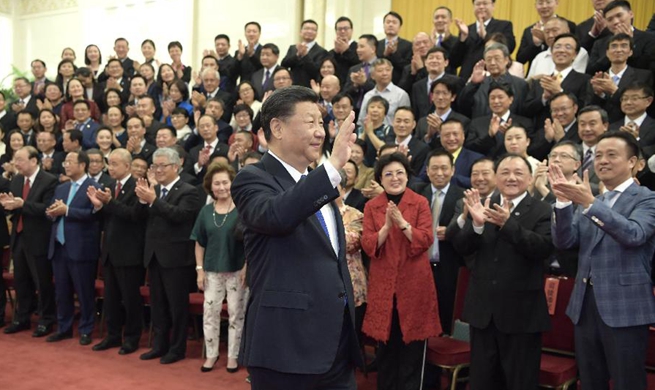BERLIN, May 29 (Xinhua) -- The German government's climate cabinet confirmed that the country will adhere to the climate targets for 2030 to which it has committed itself internationally, according to a statement by government spokesperson Steffen Seibert on Wednesday.
This would mean significant additional carbon dioxide (CO2) reductions year after year. Furthermore, the German government would consider climate change a "key focus of its work," he said.
The climate cabinet will make key decisions about climate action legislation and measures in September, Seibert said.
The climate cabinet is also planning to deal with the question of CO2 pricing, based on expert opinions that are "currently being drawn up," according to Seibert.
The German government's goal is a "very ambitious reduction of greenhouse gases in line with prosperity, social security and economic competitiveness on the basis of social consensus," Seibert emphasized.
He said that the German coal commission's proposal to phase out coal-fired power generation, which reflected all affected interests, was "an excellent example" of this.
Transport Minister Andreas Scheuer, a member of the climate cabinet, aims to achieve the climate targets in transport with a comprehensive package of over 50 measures.
The measures to reduce CO2 emissions from transport include extending and increasing the government bonus for the purchase of electric cars as well as reducing the value added tax on long-distance train tickets.
"We have a lot of levers," commented Scheuer on the proposed measures. "If we start with each individually, we can achieve a resounding effect without burdening people any more".
"We are fully committed to clean fuels," said Scheuer. To this end, the minister is pushing for adoption of a billion-euro support program for hydrogen and fuel cell technology.
Although Germany's Minister for the Environment Svenja Schulze (SPD) sought to regulate by law the extent to which sectors such as transport, industry or agriculture needed to reduce their greenhouse gas emissions, it looks like Germany will opt for a CO2 pricing scheme rather than a flat tax on carbon.
The environment ministry's draft climate protection law leaves it up to the responsible federal departments to define concrete measures for achieving these CO2 reductions.
Schulze's plans were met with heavy criticism from the SPD's coalition partners, the German conservative CDU-CSU union.
Interior Minister Horst Seehofer (CSU) has rejected Schulze's draft climate protection law, saying that "I do not think that is appropriate."
Regarding the introduction of a CO2 tax, Germany's Minister for Research, Anja Karliczek, told the German news channel n-tv that the government had "spoken out very clearly in favor of CO2 pricing. But it must be CO2 pricing and not a tax."
In order to improve the heating efficiency of buildings in the country, Seehofer is planning to make the climate-friendly renovation of older buildings tax deductible. The government would support this tax scheme with 1 billion euros per year.
"That would be a powerful step. Replacing old heating systems, facades and roof structures could noticeably reduce CO2 emissions from old buildings," Seehofer told the German press agency (dpa) on Wednesday.
Although Seehofer is committed to climate protection, he stressed that "one thing is clear: living must remain affordable. For me, this is an equivalent goal to climate protection. I will therefore only advocate measures that ensure both."
The German population is becoming increasingly aware of the importance of climate protection, according to a study published by the German environment ministry on Tuesday.
Almost two-thirds of those asked described environmental and climate protection as a "very important challenge." Many, however, were not convinced that the German government is doing enough in this field.
According to the study, only 14 percent of Germans agreed that the government "does enough" or "does rather enough" to protect the climate and the environment.













